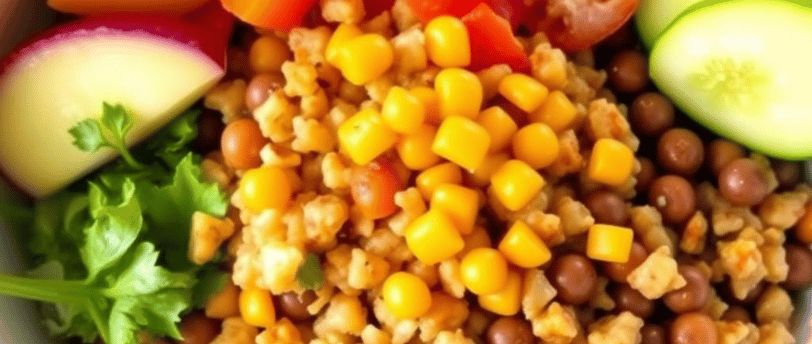Eat Fiber-Rich Foods for Regularity: Whole Grains, Beans, and Vegetables Support Gut Motility
🧘WELLNESS TIPS🌱 GUT HEALTH & DIGESTION


In an era where fast-paced lifestyles often lead to convenience eating and a reduction in food quality, one aspect of our diet remains crucial for maintaining overall health: fiber. Specifically, fiber-rich foods—such as whole grains, beans, and an array of vegetables—play a pivotal role in ensuring regularity, promoting gut motility, and enhancing overall digestive health. In this article, we will explore the scientific evidence around fiber, how it supports gut function, and practical tips for incorporating fiber-rich foods into your diet.
Understanding Dietary Fiber
Dietary fiber is a carbohydrate that the body cannot digest. Unlike sugars and starches, fiber passes through your digestive system relatively intact. There are two types of dietary fiber: soluble and insoluble.
Soluble Fiber: This type dissolves in water and forms a gel-like substance. It’s found in foods such as oats, beans, apples, and citrus fruits. Soluble fiber can help manage cholesterol levels and aid in blood sugar control.
Insoluble Fiber: This kind does not dissolve in water and adds bulk to your stool, helping food pass more quickly through your stomach and intestines. It is found in whole grains and vegetables. A diet rich in insoluble fiber is essential for preventing constipation and promoting regular bowel movements.
The Role of Fiber in Gut Motility
Gut motility refers to the movements of the digestive system, which can significantly influence gastrointestinal health. Scientific evidence suggests that a high-fiber diet aids in maintaining optimal gut transit time—the time it takes for food to travel through the digestive tract.
A study published in the journal Gastroenterology highlights the relationship between dietary fiber intake and improvements in gut transit time. The researchers found that participants who consumed a high-fiber diet experienced increased stool frequency and softer stool consistency. Moreover, fiber intake is associated with the stimulation of beneficial gut bacteria, which can also enhance gastrointestinal motility.
Another significant aspect to consider is that fiber increases the production of short-chain fatty acids (SCFAs) when fermented by gut bacteria. These SCFAs have been shown to support gut barrier function, reduce inflammation, and improve overall gut health. Furthermore, a healthy gut microbiome—a diverse community of microorganisms residing in our intestines—is essential for effective digestion and regularity.
Whole Grains: The Foundation of a High-Fiber Diet
Whole grains are an excellent source of dietary fiber and have substantial health benefits. Unlike refined grains, whole grains contain all parts of the grain—the bran, germ, and endosperm. This means they are rich in nutrients and fiber, essential for optimal digestion.
Popular whole grains include:
Oats: Rich in beta-glucan, a type of soluble fiber that can lower cholesterol and improve heart health.
Quinoa: A complete protein and a good source of fiber, which aids in gut health.
Brown Rice: Whole brown rice is fiber-rich and helps maintain regular bowel movements.
Research indicates that a diet rich in whole grains is associated with a lower risk of developing digestive disorders. A study published in the American Journal of Clinical Nutrition showed that individuals consuming whole grains had better gut health markers than those who primarily consumed refined grains.
Beans: A Nutrient-Dense Fiber Powerhouse
Beans, which include lentils, chickpeas, black beans, and kidney beans, are among the best sources of dietary fiber. They are unique because they provide both soluble and insoluble fiber, making them an excellent addition to any diet aimed at improving gut motility.
One of the most compelling scientific pieces of evidence related to beans comes from a study published in the Journal of Nutrition. This study found that individuals who incorporated beans into their diet experienced a significant increase in stool frequency and a decrease in symptoms of constipation.
The high fiber content in beans can also contribute to satiety, making them an excellent option for those looking to maintain or lose weight. Additionally, beans are rich in protein, vitamins, and minerals, making them a highly nutritious, versatile food choice.
Vegetables: Nature’s Fiber-Rich Gifts
Leafy greens and other vegetables are exceptional sources of dietary fiber, as they provide a wealth of nutrients along with contributors to gut motility.
Certain vegetables, such as:
Broccoli: High in fiber and rich in sulforaphane, which has anti-inflammatory properties.
Brussels Sprouts: Contain both soluble and insoluble fiber, promoting regular bowel movements.
Carrots: Provide both fiber and antioxidants, contributing to a healthy digestive system.
Research has documented the impact of increased vegetable intake on digestive health. A study in the American Journal of Gastroenterology found that increased consumption of vegetables improved bowel morbidity among participants, reinforcing the idea that a fiber-rich diet is essential for maintaining good gut health.
Practical Tips for Incorporating Fiber-Rich Foods
Transitioning your diet to include more fiber-rich foods can seem daunting, but with a few simple strategies, you can enhance your digestive health effectively:
Start Gradually: Increase fiber intake slowly to avoid bloating or gas, giving your digestive system time to adapt.
Mix It Up: Include a variety of fiber sources in your diet, from whole grains and beans to an array of colorful vegetables.
Snack Smart: Choose fiber-rich snacks, such as fresh fruits, nuts, or hummus with vegetable sticks.
Stay Hydrated: Adequate water intake is crucial when consuming fiber, as it helps the fiber work effectively in your system.
Read Labels: Look for foods labeled as “whole grain” and check the fiber content to make informed choices.
Conclusion
Incorporating fiber-rich foods like whole grains, beans, and vegetables into your diet is essential for maintaining regularity and ensuring proper gut motility. The scientific evidence supporting the health benefits of dietary fiber cannot be overlooked, as it shows a clear link between fiber intake and improved digestive function. By embracing these nutrient-dense foods, you not only support your own gut health but also pave the way for a healthier, more balanced lifestyle. Making the shift to a fiber-rich diet is a small but impactful change that can yield significant long-term health benefits.
